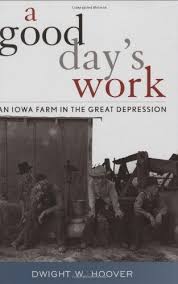Labor and Farm Labor
My mother’s family hails from Van Wert County in western Ohio. Several of my relatives were farmers, working mostly corn and soy beans. As a child, in the 1960s and 1970s, my visits to the Ohio relatives often included trips to their farms. While I had fun in the barns and enjoyed sitting in the tractors, it was also a learning experience. The grown-ups talked of weather, debt, technology, prices and who was and was not turning a profit. I picked up that it was hard, risky and difficult work. In fact, it was well-nigh impossible to romanticize farming after spending an afternoon around hogs or listening to stories of bankruptcy.
Dwight W. Hoover’s A Good Day’s Work: An Iowa Farm in the Great Depression is an academic’s memoir of farm life and labor. Hoover, an emeritus professor of history at Ball State, gives a remarkably clear-eyed account. He writes with great clarity and detail. It reminded me of John Kenneth Galbraith’s account of growing up on a farm: work, work and more work – with little promised and even less assured.
The book is organized around the seasons. Hoover’s mind for the details of farm work is amazing. We learn about the impact of a road and of an irregularly shaped field. These things make a difference. He also brings his historical lens to bear. The struggles of the Hoovers and the 100-acres is best understood locally and in the context of the Great Depression. Technology, too, plays an extraordinarily important part of the story. Hoover explains tools, machines, and changes wrought by machines. The purchase of a tractor was a significant economic investment and marked a significant change in how the Hoovers farmed.
Hoover explains his decision to leave a farming life in the context of his high school reunion. He is not recognized by his peers. He no longer belongs to the community. So, too, have the Great Depression farms changed. There is some wistfulness, but the harsh realities of farm life make his decision straightforward. Had Hoover remained on the farm, his chance of marrying would have been slim. Had Hoover remained on the farm, he would have seen his work change as technologies and conditions changed.
This is an interesting and thoughtful book, an important reminder of what the “Good Old Days” were really like.
David Potash